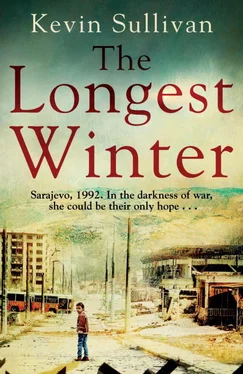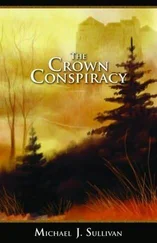That day, Milena saw that Fudo was no longer imperturbable. He was afraid.
His fear infected the air and with Fudo Omeragić’s fear, Milena’s world began to burn.
Fudo was dressed the way he customarily dressed: sloppily. He was wearing a pale green polo shirt and grey slacks and sandals. His shirt stretched over his belly.
Fudo kept a good crowd going at his bar, people who’d known one another all their lives, people who’d known Fudo all their lives. He ran the place without very much visible effort. He did most things without very much effort. His aspirations in life were, as far as anyone knew, unexceptional. He was married to Amela and they had two small children, a boy called Fadil and a girl called Snjezana.
But on that sunny afternoon in Foča Fudo Omeragić’s fear polluted the air.
And Milena didn’t run into the street to help him.
Because she was shocked. Because she had never believed it would come to this. Because she was scared.
At the bar, Milena and Fudo were a team. But now she didn’t help him. Suddenly faced with an avalanche of evil, she froze.
Amela and the children had already left Foča by then. Fudo had sent them to stay with his brother on the coast.
The crowd moved slowly along the middle of the street. Fudo gesticulated, tried to argue. He was sweating profusely. His big moustache drooped; his eyes opened wide and his cheeks were drawn. He was taller than the others, but there were many more of them, about a dozen men. Those at the front pushed him. Milena strained to see what was happening. Ordinary men from the town – drivers and builders and shopkeepers and farmers – had become a mob. They had seized a neighbour, a man they once respected, and set upon him because of his name, because of what that meant – that he worshipped differently if he worshipped at all.
Fudo’s name condemned him; Milena’s name protected her. But she would not accept that protection. She packed her things that afternoon. Clothes, some money, a handful of keepsakes. She left before her husband came home, walked to the bus station and took the first bus out of town.
When she reached the city, just before the barricades became permanent and the siege began, she stayed two nights with a schoolfriend who got her a job. The Rebels had surrounded the city with artillery by then and were about to begin a campaign of shelling and sniping that would terrorise the trapped population. Water supplies and electric power were turned on and off by the besieging troops as a bargaining chip in negotiations with the government. Milena rented a one-room flat in Alipašino Polje from a couple who were leaving for the safety of the coast.
Now, in the same flat months afterwards, she listened to the news and looked out of the large window onto the broad empty boulevard below. She leaned against the lintel, the undulating surface of the cold paint against her cheek.
When Milena had left Jusuf’s apartment soon after dawn and begun to make her way to her home in Alipašino Polje, a handful of cars had passed. She tried to hitch a lift, but every car was full. She followed the stream of pedestrians along the winding road past the Holiday Inn and the Tito Barracks to the bakery in Čengić Vila. When she reached the Television Centre, on the other side of the bakery, she walked onto the main road and crossed over to Alipašino Polje.
She had to climb painstakingly the steep steps that cut through the estate between the tower blocks. Frozen snow made the climbing treacherous. At the summit was a terrace with a view of the city. The concrete slabs were scarred by shell craters and surrounded by burned and mangled cars. She walked to her block.
Milena felt safe in her apartment, even though it was exposed to shellfire. The building had been hit four times with one fatality, an old man who remained in his bed during the worst of the bombardments, refusing to go below to the shelter. Yet Milena felt safe. Safe from Foča. Safe from what had happened there.
She did not, however, feel entirely safe from Mrs Hatibović and her nosey questions. As Milena struggled to make her key turn in the frozen lock, Mrs Hatibović emerged from the next-door apartment.
The old woman gave her a look of suspicion and said, ‘You’re back!’
Milena was inclined to ignore Mrs Hatibović, but the woman was not easily brushed off. ‘Did you stay in town?’
‘There was too much shelling. I thought it would be safer there.’
‘It’s more dangerous there, in the town. That’s where the shelling is worst!’
Mrs Hatibović waited for a response, but Milena had opened the door and stepped inside out of view.
The old woman shrugged and hurried across the landing to tell Mrs Nurudinović that Milena had returned home.
Snow was falling now, illuminated by the pale white glitter of the moon. No one moved outside. In the distance Milena heard anti-aircraft fire, and further away the thud of howitzer shells, perhaps near Vogošća, but in the city it was quiet.
The snow fell in Marijin Dvor, on the broken concrete carcass of the Parliament building, spreading softly over the ghostly wreck. It fell on the cold grey towers of Alipašino Polje, set on a hill beside the broken railway yards and factories to the west. And it fell in a silent coiling cloud across the tops of buildings in Ciglane where the apartments looked out on a park empty of trees. The blizzard spread an icy shroud over the city. It fell on the Lion Cemetery and on the new graves in the sports field by the Olympic Stadium.
In the cobbled courtyard of the Husref Beg Mosque drifts of snow collected by the ancient stones and covered the little paths between Ottoman halls, and it collected too on the roof of the Islamic University, where the yellowing Austro-Hungarian facade made a bleak and delicate silhouette against the silver storm. On the cathedral, on the Orthodox church, on the synagogue by the River Miljacka, snow drifted downward, silent, white in the black night.
The presidency, a Habsburg palace, stood as a dark mass against the descending tide of white. Nearby, the snowstorm curled silently around the old dome of the Alipašino Mosque.
Snow fell in the courtyard of the State Hospital, freezing in the night. By daybreak the entrance would be blocked with frozen drifts, and stretchers would be carried over ice uncertainly. And in the grounds of the Koševo Hospital too, amid the shell craters and the frozen mud, snow fell.
The cloud engulfed charred timber and broken stones in the great injured shell of the burned-out National Library. In Grbavica swirling snowflakes drifted through the narrow slits of sniper nests, where troops dozed in the freezing midnight dark. Snow fell on the frontlines, on Mojmilo, on Žuč, on Trebević. In Otes snow fell on the ruined apartment blocks where two armies slept just yards apart. It fell on the frozen Miljacka, writhing palely through the battlefields to the west.
Snow fell on the narrow cobbled alleyways of the Old Town, among the minarets. It descended softly on the avenues of the city centre, where a lamp by a window here and there shed a weak light on tenemented streets.
It fell on Bistrik, on the steep decline from the brewery and the Franciscan church to the river. It fell on the shattered buildings where 400,000 people huddled. Hungry children slept in the storm. Men and women lay awake in the icy silence.
At a crossing two miles west of the Koševo Hospital a thirty-four-year-old man lay on his back, arms stretched to heaven, legs spread-eagled, glasses smashed, still on his face, now frozen, engulfed in snow. The man’s wife and child waited for him in a basement apartment twenty yards away. The basement was sheltered, but the crossing was exposed. He had been felled by an explosion just seconds from reaching his home and family. He was found the next morning by a neighbour.
Читать дальше












